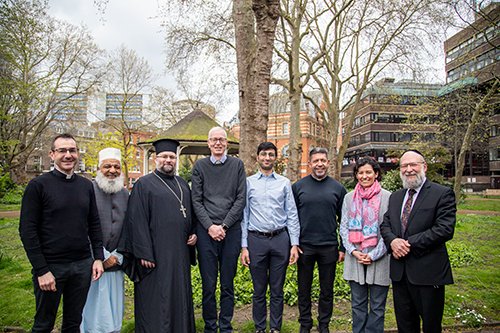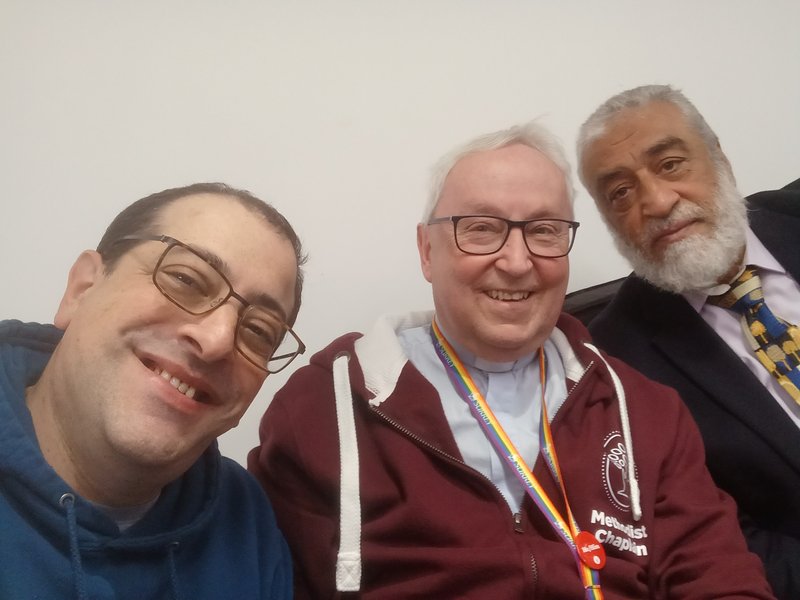Chaplaincy and conflict
Finding common ground in Higer Education chaplaincy during times of international conflict
14 January 2025
14 January 2025
The conflict involving Israel, Hamas and Gaza has had repercussions around the world. The international tensions caused by this war have been felt at universities and higher education establishments here in Britain.
This has created a challenging time for Higher Education chaplains, working to find common ground in an interfaith environment where the physical and emotional safety and security of all students and staff is paramount. Here, two Higher Education chaplains share their experiences.
The Revd Ian Worsfold is Coordinating Chaplain at City St George’s, University of London.

A phrase that is gaining traction in the Higher Education sector is ‘disagreeing well’. The Chaplaincy Team at City St George’s, University of London has tried to live out this ethos for some time. As chaplains from different faith traditions and different Christian denominations, we don’t all think and believe the same things. However, in spending time with each other, in working for a common goal – the spiritual flourishing of students and staff within the institution – we are able to find respect for each other within our differences.
That’s all well and good, until world events of devastating proportions raise their heads and have a direct impact on the diverse student and staff body. Disagreeing over the finer points of theology is one thing. Coming to a mind on how to respond to the events of 7 October 2023 and what has followed is another thing altogether. It will come as little surprise to know that within a multi-faith team, we don’t have a single mind on actions and responses in Gaza, Israel and the surrounding region.
Initial reactions after the 7 October attacks were understandably of shock, not least of all as there were members of City St George’s community with relatives in Israel, some of whom were killed in the attacks. The newly formed Jewish Community Inclusion group took a very different focus, as we were no longer dealing with people’s sense of belonging, we were dealing with their grief and shock.
What the chaplaincy team has been able to do since is to be on hand to advise senior leaders on appropriate responses. This isn’t easy in an institution that has a sizeable Muslim representation, a much smaller Jewish[1] representation and an openly Jewish President (equivalent to Vice-Chancellor). Clearly no one is neutral on the issue, but our role within chaplaincy is to curate safe spaces where people can share their perspectives, fears and concerns openly and honestly, without judgement. That’s not to say perspectives can’t be challenged along the way, for example if they’re based on false assumptions or incorrect facts.
There have been protests outside the university, which has made it difficult for some of our Jewish students and staff to enter the building. This raises the vexatious issue of freedom of speech and that fine line between freedom to express opinion and how that opinion is expressed and received by others. We haven’t seen the encampments that other universities have experienced, but at the request of the chaplaincy, we did meet with senior leaders to consider an appropriate response, should that happen here.
As the conflict continues well into its second year, the underlying tension remains. What also remains is our resolve to do all we can in support of City St George’s diverse community – encouraging us to disagree well and maintain respect for those with whom we disagree.
[1] Acknowledgment is made here that these identities do not equate to clear dividing lines between pro-Palestinian and pro-Israeli sentiments. The picture is far more mixed and nuanced than that, but this is a helpful indicator of the particular context at City St George’s.
The Revd Paul Glass is chaplain at the University of Surrey
The Chaplaincy Team at the University of Surrey has been unique and ground-breaking over a long period of time. There are over twenty people currently attached to the Chaplaincy Team from eight different faith groups. The team interviews and appoints all new members to the group and insist that they be prepared to work in a multi-faith context as part of a team.

Rabbi Alex Goldberg (Jewish Chaplain), Revd. Dr. Paul Glass (Methodist Chaplain) and Dr. Husni Hammuda (Muslim Chaplain) worked together to engage with students from the doctoral college of the University - greeting students of all faiths and none.
A number of the Chaplains at the University have been working together for some time and have built up strong relationships of mutuality and trust. The Jewish Chaplain (Rabbi Alex Goldberg) is one of two Principal Chaplains and has been part of the University for some 20 years. The Muslim Chaplain, Dr. Husni Hammuda, has also been on staff at the University for some years.
In my judgement, this mutuality of trust and respect has been a significant part of the reasons why this University has not seen strain and disruption surrounding the current conflict in the Middle East.
While it would not be true to say there have been no instances of tension within the life of the university as a result of the conflict in the Middle East, the general atmosphere since has been one of open listening and respectful conversation.
What has been shown is that chaplaincy at its best is relational. Building connections of care, respect and esteem within the Chaplaincy Team and then the modelling of those relationships to others has been fundamental to building a campus-wide atmosphere where all should feel welcomed and supported and know that mutual understanding is key to how we live and work together.
It is a privilege to be the Methodist representative on such an extraordinary team.